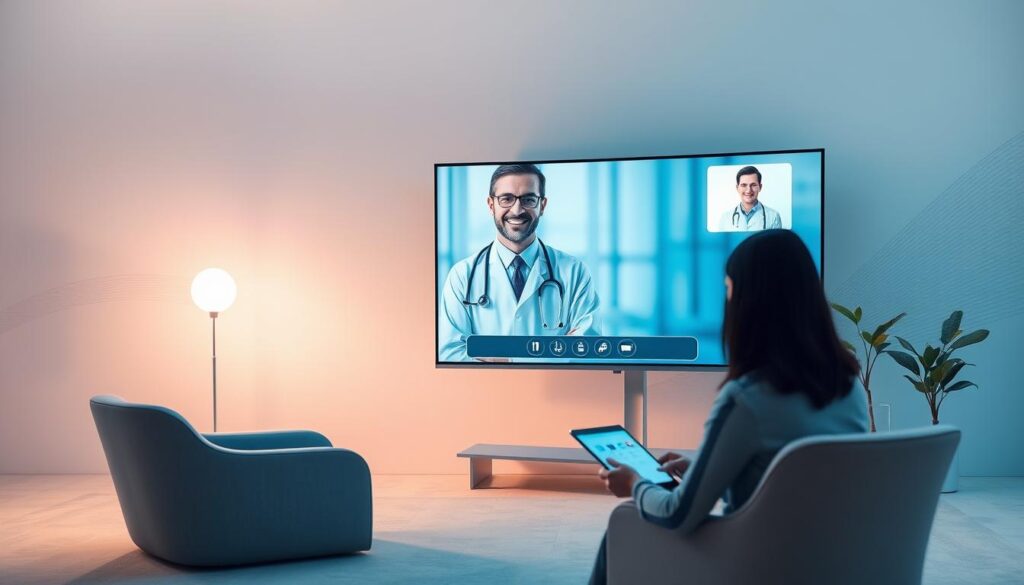This post contains affiliate links. As an Amazon Associate I earn from qualifying purchases
In today’s fast-paced world, accessing quality healthcare has become more convenient than ever, thanks to the rise of telehealth solutions.
Patients can now connect with healthcare professionals from the comfort of their own homes, revolutionizing the way healthcare is delivered.
Online medical consultations are making healthcare more accessible and efficient, allowing patients to receive timely medical care without the need for in-person visits.
Key Takeaways
- Telehealth solutions are transforming the healthcare industry.
- Patients can access quality healthcare from the comfort of their own homes.
- Online medical consultations are becoming increasingly popular.
- Timely medical care is now more accessible than ever.
- Healthcare is becoming more efficient and convenient.
What Are Online Medical Consultations?
Telehealth services, including online medical consultations, are changing the face of modern healthcare. With the advancement of digital technologies, patients can now access medical care from the comfort of their own homes.
Definition and Overview
Online medical consultations, also known as virtual doctor visits or digital health consultations, involve the use of electronic communication and information technologies to provide healthcare services remotely. This form of healthcare delivery has gained popularity due to its convenience and flexibility.
The concept of telehealth encompasses a broad range of services, including online consultations, remote monitoring, and digital communication between healthcare providers and patients. By leveraging these technologies, healthcare providers can offer timely and effective care to patients with various medical needs.
How They Work
Online medical consultations typically involve a secure video conferencing platform that allows patients to connect with healthcare providers remotely. To initiate a consultation, patients usually need to create an account on a telehealth platform, provide their medical history, and schedule an appointment.
During the consultation, patients can discuss their symptoms, receive diagnoses, and obtain treatment recommendations from licensed healthcare professionals. Many telehealth platforms also offer additional services, such as prescription medication management and follow-up care.
Benefits of Telehealth
The benefits of online medical consultations are numerous. Some of the key advantages include:
- Increased accessibility to healthcare services, particularly for rural or underserved populations
- Reduced wait times and improved scheduling flexibility
- Enhanced patient comfort and convenience, as consultations can be conducted from home
- Potential cost savings, as online consultations can reduce the need for in-person visits and associated travel expenses
| Benefits | Description |
|---|---|
| Increased Accessibility | Telehealth services reach rural or underserved areas |
| Reduced Wait Times | Flexible scheduling reduces wait times for patients |
| Enhanced Comfort | Patients can receive care from the comfort of their homes |
| Cost Savings | Reduced need for in-person visits and travel expenses |
Advantages of Online Medical Consultations
The advantages of online medical consultations are multifaceted, enhancing the overall patient experience. With remote healthcare services, patients can access medical care from anywhere, at any time, as long as they have a stable internet connection.
Accessibility for All
One of the significant benefits of e-consultations is the increased accessibility they offer. Patients with mobility issues, those living in remote areas, or individuals with busy schedules can now easily consult with healthcare professionals without the need for physical travel.
Reduced Wait Times
Online medical consultations significantly reduce wait times, allowing patients to receive timely medical attention. This is particularly beneficial for those who require urgent care or have conditions that necessitate prompt intervention.
Comfort of Home Consultations
The comfort of receiving medical consultations from home cannot be overstated. Patients can avoid the stress and discomfort of traveling to a healthcare facility, and instead, enjoy the familiarity and comfort of their own homes during consultations.
Moreover, being in a comfortable environment can help patients feel more at ease during discussions with their healthcare providers, potentially leading to more open and honest communication.
Types of Conditions Treated Online
Telemedicine has expanded the scope of online medical care, making it possible to treat a variety of conditions virtually. Online medical consultations are not limited to minor issues; they can be used to manage a wide range of health concerns, from common medical issues to chronic illnesses and mental health support.
Common Medical Issues
Many common medical issues can be effectively diagnosed and treated through telemedicine appointments. These include:
- Respiratory infections
- Skin conditions
- Urinary tract infections
- Allergies
For instance, patients experiencing symptoms of a respiratory infection can consult with a healthcare provider online, who can then prescribe necessary medication or recommend further testing if needed.
Mental Health Support
Mental health support is another critical area where online medical consultations have proven to be highly beneficial. Virtual sessions with mental health professionals can provide patients with the support and guidance they need to manage their conditions effectively.
The benefits of virtual mental health support include increased accessibility, reduced wait times, and the comfort of receiving care from home.
Chronic Illness Management
Chronic illness management is also well-suited for virtual medical appointments. Conditions such as diabetes, hypertension, and asthma require ongoing monitoring and care, which can be efficiently managed through regular online consultations.
| Condition | Benefits of Online Care | Examples of Treatment |
|---|---|---|
| Common Medical Issues | Convenience, Reduced Wait Times | Antibiotics for infections, allergy medication |
| Mental Health | Increased Accessibility, Comfort | Therapy sessions, counseling |
| Chronic Illness | Ongoing Monitoring, Personalized Care | Medication management, lifestyle counseling |
Choosing the Right Online Consultation Service
The plethora of web-based healthcare consultations makes it crucial to know what to look for in a service. With so many options available, it’s essential to consider several factors to ensure you receive the best possible care.
Factors to Consider
When selecting an online consultation service, there are several key factors to keep in mind. Reliability and availability of healthcare professionals are paramount. You should also consider the range of services offered, ensuring they meet your specific healthcare needs.
- Qualifications and experience of healthcare providers
- Types of consultations available (e.g., video, phone, text)
- Hours of operation and wait times
Reputable Platforms
Opting for a reputable platform is vital for a secure and effective online consultation experience. Look for services that are HIPAA compliant and have a strong reputation for patient confidentiality.
Some well-established telehealth platforms have built a trustworthy reputation by adhering to high standards of care and security. When in doubt, checking for certifications or accreditations can guide your decision.
User Reviews and Ratings
User reviews and ratings can provide valuable insights into the quality and reliability of an online consultation service. Pay attention to feedback regarding the ease of use of the platform, as well as the quality of care received.
While individual experiences may vary, a pattern of positive reviews can indicate a trustworthy service. Conversely, consistent negative feedback should raise red flags.

Preparing for Your Online Consultation
Preparing for an online medical consultation involves several key steps to ensure a productive and stress-free experience. By being prepared, you can make the most of your virtual visit and receive the care you need efficiently.
What Information to Gather
Before your online consultation, it’s crucial to gather all relevant medical information. This includes:
- Your medical history, including past illnesses and allergies
- A list of your current medications and dosages
- Any recent test results or medical records relevant to your consultation
- A list of questions or concerns you want to discuss with your healthcare provider
Having this information readily available will help your healthcare provider understand your condition better and provide more accurate advice.
Technical Requirements
To ensure a smooth online consultation, you need to meet certain technical requirements:
| Technical Aspect | Requirement |
|---|---|
| Device | A computer, tablet, or smartphone with a camera and microphone |
| Internet Connection | A stable internet connection with sufficient bandwidth for video conferencing |
| Software | A compatible web browser or telehealth application |
Ensuring your technology is in good working order before the consultation can prevent unnecessary delays or disruptions.
Tips for a Successful Visit
To maximize the effectiveness of your online consultation, consider the following tips:
“Clear communication is key to a successful telehealth visit. Be open about your symptoms, concerns, and medical history.”
- Find a quiet, private space for your consultation to minimize distractions
- Use a headset or earbuds with a microphone for better audio quality
- Be prepared to describe your symptoms in detail
- Have a family member or friend available if needed for support
By following these guidelines, you can have a successful and satisfying online medical consultation experience.
Understanding Privacy and Security
With the growth of telehealth, understanding the privacy and security measures in place is crucial for patients and healthcare providers alike. Online medical consultations involve the exchange of sensitive patient information, making robust security measures essential.
HIPAA Compliance
Telehealth platforms must comply with the Health Insurance Portability and Accountability Act (HIPAA), which sets standards for protecting patient health information. HIPAA compliance ensures that patient data is handled confidentially and securely.
Key aspects of HIPAA compliance include:
- Encrypting patient data both in transit and at rest
- Implementing secure authentication and authorization processes
- Conducting regular security audits and risk assessments
Data Protection Measures
In addition to HIPAA compliance, telehealth platforms employ various data protection measures to safeguard patient information. These include:
| Measure | Description |
|---|---|
| Encryption | Protects data from unauthorized access |
| Firewalls | Blocks malicious traffic and unauthorized access |
| Secure Servers | Stores data in secure, monitored environments |
Patient Confidentiality
Maintaining patient confidentiality is a cornerstone of healthcare, and telehealth is no exception. Telehealth providers ensure confidentiality through secure communication channels and strict access controls.
Patients can further protect their confidentiality by:
- Using secure internet connections for consultations
- Avoiding public areas for video consultations
- Understanding their telehealth platform’s privacy policies
Cost of Online Medical Consultations
Understanding the cost of online medical consultations is crucial for patients considering virtual doctor visits. The financial aspect of telehealth can be a significant factor in a patient’s decision-making process.
Insurance Coverage
Many insurance providers now cover telehealth services, including online medical consultations. Patients should check with their insurance company to determine the extent of their coverage.
- Some insurance plans cover 100% of telehealth services.
- Others may require a copayment, similar to in-person visits.
- A few plans might not cover telehealth at all.
Out-of-Pocket Expenses
For patients without insurance or with plans that don’t cover telehealth, out-of-pocket expenses are a consideration. The cost can vary based on the platform used and the type of consultation.
Factors influencing out-of-pocket costs:
- The complexity of the medical issue.
- The qualifications and experience of the healthcare provider.
- The technology used for the consultation.
Comparing Costs with In-Person Visits
When comparing the costs of online medical consultations to in-person visits, several factors come into play. While the direct cost of the consultation is a factor, other savings should also be considered.
| Cost Component | Online Consultation | In-Person Visit |
|---|---|---|
| Consultation Fee | Varies by platform | Typically higher |
| Travel Costs | $0 | Varies (transportation, parking) |
| Time Off Work | Minimal | Often significant |
In conclusion, while the cost of virtual doctor visits can vary, they often provide a cost-effective alternative to traditional in-person medical consultations when all factors are considered.
The Future of Online Medical Consultations
Online medical consultations are on the cusp of a revolution, driven by emerging technologies. As we look to the future, it’s clear that digital health consultations will play an increasingly vital role in shaping the healthcare landscape.
Emerging Technologies
The integration of Artificial Intelligence (AI) and Internet of Things (IoT) devices is transforming the way healthcare is delivered remotely. AI-powered chatbots are being used to triage patients, while IoT devices enable continuous monitoring of vital signs.

Trends in Telehealth
One of the significant trends in telehealth is the shift towards personalized medicine. With the help of advanced data analytics and machine learning algorithms, healthcare providers can now offer tailored treatment plans based on individual patient needs.
Another trend is the expansion of remote monitoring capabilities, allowing patients with chronic conditions to be managed more effectively from the comfort of their homes.
Predictions for Patient Care
As remote healthcare services continue to evolve, we can expect to see improved patient outcomes due to enhanced accessibility and more timely interventions. The future of patient care will be characterized by increased patient engagement and more proactive healthcare management.
- Enhanced patient-provider communication
- Increased use of data analytics for preventive care
- Greater emphasis on patient-centered care
Addressing Common Concerns
Online medical consultations are changing the face of healthcare, but not without sparking some common concerns. As more patients turn to e-consultations and telemedicine appointments, it’s essential to address these concerns and provide clarity on the benefits and limitations of telehealth.
Quality of Care
One of the primary concerns patients have is whether the quality of care received through online consultations is comparable to in-person visits. Studies have shown that telemedicine appointments can be just as effective as traditional consultations for many conditions. In fact, a significant number of patients report high satisfaction rates with telehealth services.
The quality of care is maintained through:
- Licensed healthcare professionals
- Advanced diagnostic tools
- Secure and private communication channels
Misconceptions About Telehealth
Several misconceptions about telehealth still prevail. Some believe that online consultations are only for minor issues, while others think that telehealth is impersonal. However, telehealth can be used for a wide range of medical conditions, from chronic disease management to mental health support.
Let’s debunk some common myths:
| Myth | Reality |
|---|---|
| Telehealth is only for rural areas. | Telehealth is accessible to anyone with a stable internet connection, regardless of location. |
| Online consultations are less personal. | Many patients report feeling more comfortable discussing their health issues from the privacy of their own homes. |
| Telehealth is not secure. | Reputable telehealth platforms are HIPAA compliant, ensuring patient confidentiality and data protection. |
When Not to Use Online Consultations
While telehealth is versatile, there are situations where in-person visits are necessary. For instance, conditions that require physical examination or diagnostic tests that cannot be conducted remotely may necessitate a visit to a healthcare facility.
It’s crucial to understand that:
- Emergency situations require immediate in-person care.
- Certain medical conditions may require more frequent in-person monitoring.
- Patients with complex needs may benefit from a combination of telehealth and in-person visits.
By understanding the appropriate use of e-consultations and telemedicine appointments, patients can make informed decisions about their healthcare.
Success Stories from Patients
The rise of web-based healthcare consultations has led to numerous success stories, highlighting the positive impact on patients’ lives. Patients who have used virtual medical appointments often report significant benefits, ranging from improved health outcomes to greater convenience.
Positive Outcomes
One of the most compelling aspects of telehealth is the positive outcomes experienced by patients. For instance, a patient with a chronic condition can receive regular monitoring and adjustments to their treatment plan without the need for frequent hospital visits.
Key benefits include:
- Reduced hospital readmissions
- Improved disease management
- Enhanced patient satisfaction
Key Testimonials
Patients who have used virtual medical appointments often share their positive experiences. As one patient noted,
“Telehealth has been a game-changer for me. I can get the care I need from the comfort of my own home.”
| Patient Condition | Telehealth Benefit | Outcome |
|---|---|---|
| Chronic Diabetes | Regular monitoring and timely interventions | Improved blood sugar control |
| Mental Health Support | Access to counseling services remotely | Enhanced mental well-being |
| Post-operative Care | Follow-up consultations without travel | Faster recovery and reduced complications |
Real-Life Experiences
Real-life experiences of patients using web-based healthcare consultations underscore the versatility and effectiveness of telehealth. For example, a busy professional can receive medical consultations during their lunch break, avoiding the need to take time off work.
These stories highlight the potential of virtual medical appointments to transform healthcare delivery, making it more accessible and patient-centered.
Getting Started with Online Medical Consultations
Embarking on online medical consultations can seem daunting, but with the right guidance, it’s a straightforward process. Telehealth solutions have made it possible for patients to access quality medical care from the comfort of their homes.
Locating a Provider
To find a provider, start by checking with your insurance company for a list of covered telehealth services. You can also search online for reputable platforms offering online medical consultations. Look for reviews and ratings from other patients to help you make an informed decision.
Scheduling Your First Appointment
Once you’ve selected a provider, scheduling your first appointment is typically done through their website or mobile app. Be prepared to provide some basic medical information and choose a time that suits you. Technical requirements such as a stable internet connection, a computer or smartphone, and a webcam (if needed) should be checked in advance to ensure a smooth consultation.
Managing Subsequent Visits
For follow-up appointments, most telehealth platforms allow you to schedule directly through their system. Keeping track of your appointments and any follow-up instructions from your provider is crucial for effective ongoing care.
FAQ
What is a virtual doctor visit?
How do I prepare for an online medical consultation?
Are online medical consultations secure?
Can I get prescriptions through online medical consultations?
How do I choose the right online consultation service?
Are online medical consultations covered by insurance?
Can I use online medical consultations for chronic illness management?
What are the benefits of using telehealth solutions?
How do online medical consultations compare to in-person visits in terms of cost?
This post contains affiliate links. As an Amazon Associate I earn from qualifying purchases




